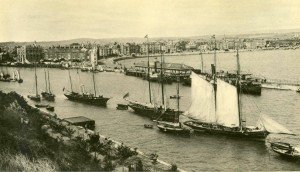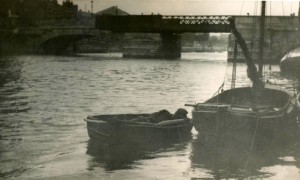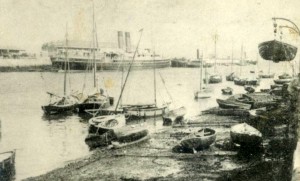1882, The Pioneers
The formation of a Sailing Club in Weymouth was first projected at a meeting in the Guildhall on a spring evening seventy years ago – March 15th,1882.
The proceedings of this historic conference are clearly recorded in the SOUTHERN TIMES of that day, of which the relevant extract has happily been preserved. From this report it appears that a certain Dr. Palgrave Simpson gathered together a score of local yachting enthusiasts [the Mayor presiding] and explained to them his proposals for the formation of a sailing club -‘for the good of the town and the amusement of those who visited it.’
In his preamble this sea-loving doctor deplored the fact that ‘such a lovely bay was not more used for sailing … the only competition being the annual August regatta,’ and he voiced sound basic principles when he said that ‘the object he had in view was purely the love of sport, £.s.d. being far in the background.’
He proposed to hold races [‘sailing competitions’] every Wednesday evening, and had drawn up a set of rules [based on Y.R.A. lines] which he then submitted to the assembled company. These rules met with instant acclaim, and it was promptly resolved to form the projected club ‘to promote boat sailing and the navigation of small craft.’ The officers were enlisted by Dr. Simpson, as follows; President, Capt. Phelps; Vice President, Col. Swaffield; Commodore, Capt. Downes; Vice-Commodore, Mr. Fitzherbert; Rear-Commodore, Capt. Chimmo, R.N., Hon. Sec., Mr. E. T. Smith; and among those present we note the names of Mr. Talbot, Mr. Learmouth, Mr. H. Warren and Mr. Bussell [a sailmaker] .
The press report aforesaid gives us glimpses of the characters of some of these noble pioneers, mostly through the twinkling eyes of Dr. Simpson. Thus ‘Col. Swaffield [who had always been knocking about in yachts] was so smitten with the idea of having a sailing club that he was off to Cowes to buy a small boat at once.’ The Commodore must have been a man of means, for he owned both a I5-tonner (the George) and a 4-tonner (the Ethel). The Vice-Commodore elect had another hobby, for he was expected to accept the post when he returned ‘from his usual shooting expedition in South Africa’; while the Rear-Commodore had ‘a nice steam yacht with which he could pick up those who carried away their boom or tumbled overboard.’ Capt. Chimmo’s mantle has surely fallen upon Mr. Moyes!
The course seems to have been an enlarged version of the present ‘0’ course, with a buoy ‘down towards Osmington’ and a mark boat off the Burdon Hotel, the start being ‘across an imaginary line to the N.N.E. of the pier. ‘There were to be three classes [20-30ft, 15-20ft, and under 15ft.] and an automatic handicapping system was instituted whereby the winner of a race owed 2 minutes upon each occasion of coming first until beaten twice.
Two boat-builders, Messrs. Talbot and Carter, looked forward to plenty of work, and the proposer of a vote of thanks to Dr. Simpson said that ‘the scheme should receive all possible support because it was likely to attract visitors. In his experience the
friends of competitors always evinced great interest in the result of a race, and something more was needed than one great grand annual regatta.’
Dr. Simpson modestly transferred the vote of thanks to the Mayor, to whom he said ‘he had only played second fiddle’, whereupon the momentous meeting ended, and the first Weymouth Sailing Club was born.
Here, for lack of further material, we must leave these happy pioneers, whom we may imagine jostling round their appointed course any Wednesday afternoon in their peaked caps, reefer jackets, and tight trousers – boatmen luffing big-game hunters, and Colonels vying with post-Captains R.N., while the Rear-Commodore appropriately brought up the rear in his ‘nice steam yacht’ waiting for someone to capsize in a standing gybe, all to the great amusement of the kindly Dr. Simpson, and all for the love of the sport [or ‘the good of the town’] with £.s.d. ‘far back in the ground.’
Thus the foundations of our present club were laid down in the slow strata of calm Victorian summers, disturbed only by faint ripples from the Boer War [‘no shootin’ expedition this year, damme!’] until the turn of the century, the death of the Queen, and the close of an era of ordered dignity and peace.
How long this original club survived we cannot say, for after this first record it vanishes into obscurity, and we find no further reference to a sailing club for a lapse of twenty years.


